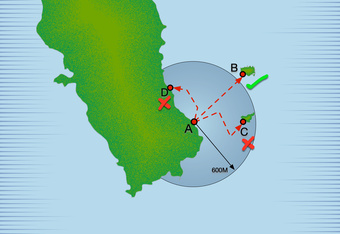Qualifying passages
Requirements for RYA exams
Definitions
- Passage: A passage is a non-stop voyage from a departure port / safe haven to a destination port / safe haven. Where a passage must be of a minimum distance to meet exam pre-requisites, the distance should be taken as the shortest navigable route established when planning a safe and efficient passage.
Passages which artificially lengthen the distance will not be accepted.In the example below where the distance run for each passage A-B, A-C and A-D exceeds 600M, only passage A-B would be accepted as a 600M qualifying passage.

The distance measured by log will almost certainly differ from the planned distance due to streams, currents, weather and other navigational factors. Both the planned distance and distance run should exceed the required distance.
Passages such as recognised races which may not comply exactly with these requirements may be submitted to the RYA for consideration before the voyage.
- Skipper: The skipper is the person nominated and responsible for the planning and execution of a passage including vessel and watch management. The skipper is not necessarily the most experienced or qualified person on board but must be the person with responsibility for the safe execution of the passage. If the skipper's role is transferred to another person at any time during a passage then neither person can claim to have skippered that passage.
- Mate: For the purpose of qualifying passages, a mate is any person on board who has sole responsibility for managing a navigational watch during a passage. They must be actively engaged in the planning and execution of a passage.
- Tidal: An area is deemed tidal if published stream, current or tidal range data is available, the influence of which is significant enough to require the effects to be taken into account to plan and execute a safe and efficient passage.
- Days on board: A day on board or as skipper is a period of eight consecutive hours living on board, the majority of which the vessel should have been at sea. Periods of less than eight hours cannot be aggregated to make up eight hours. Only one eight-hour period may be counted in any 24 hour period.
Notes
- During a qualifying passage there should be no change of skipper or mates. Trainee skippers undertaking 60 mile passages are strongly advised to obtain a Coastal Skipper qualification first.
- Examiners are responsible for establishing the level of a candidate’s competence during the exam. During RYA exams candidates will be questioned extensively about their qualifying passages, mileage and sea time.
Additional for RYA Yachtmaster Ocean:
- Candidates on Ocean qualifying passages must have acted in a capacity of either mate or skipper throughout the entire passage.
- If circumstances prevent astro sights being taken on the ocean qualifying passage candidates may take their sights on another shorter passage. Such sights must be taken whilst the vessel is on passage and out of sight of land or charted objects capable of being used for navigation/position fixing. The examiner will determine whether the candidate is competent at astro navigation.
- Qualifying passages, sea time and days as skipper must take place on a suitably sized vessel appropriate to the discipline being examined, as detailed below.
Suitability of vessels for exam pre-requisites for RYA Yachtmaster Coastal, Offshore and Ocean exams:
| Vessel size |
3Sea time - days on board and mileage valid for: |
Days as skipper valid for: |
Qualifying passages valid for: |
|---|---|---|---|
| Between 7m LWL and 24m LOA |
Coastal Offshore Ocean |
Coastal Offshore - |
- Offshore Ocean |
| Over 24m LOA up to 500gt |
Coastal 1 Offshore 1 - |
- - - |
- - Ocean 2 |
For vessels over 24m LOA greater than 500gt please contact RYA Training 2.
Notes:
- Up to 50% of the minimum requirement. Evidence of status on board required by testimonial or seaman's discharge book.
- For vessels up to 200gt candidates must hold a commercially endorsed RYA Yachtmaster Offshore or higher Certificate of Competence.
For vessels over 200gt candidates should hold an STCW Officer of the Watch (Yacht 3000gt) Certificate of Competence or higher to be able stand navigational watches during the passage. Please see MSN 1858 for further information.
- Contact training@rya.org.uk if your sea time is on a yacht greater than 24m and 500gt.
